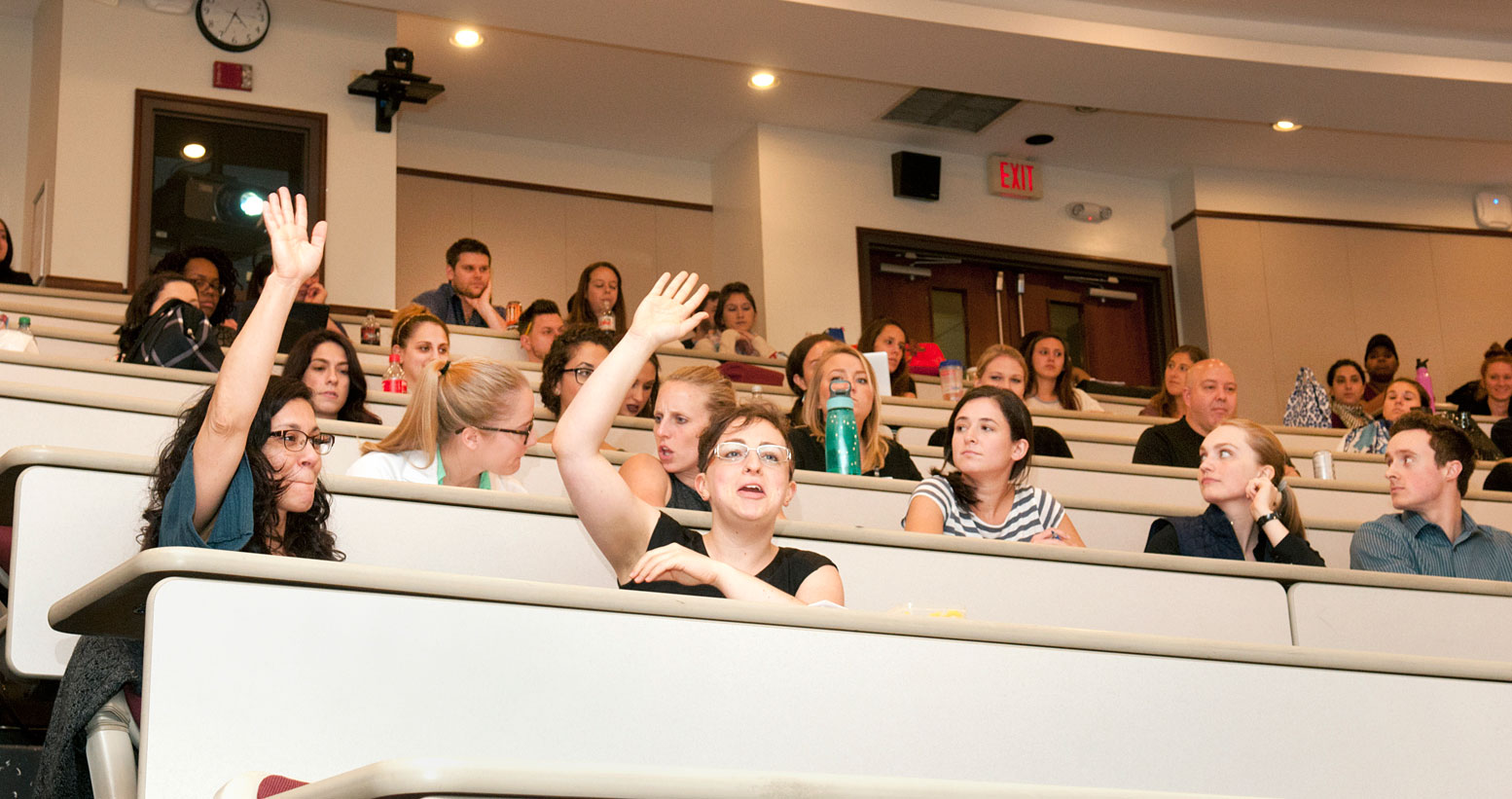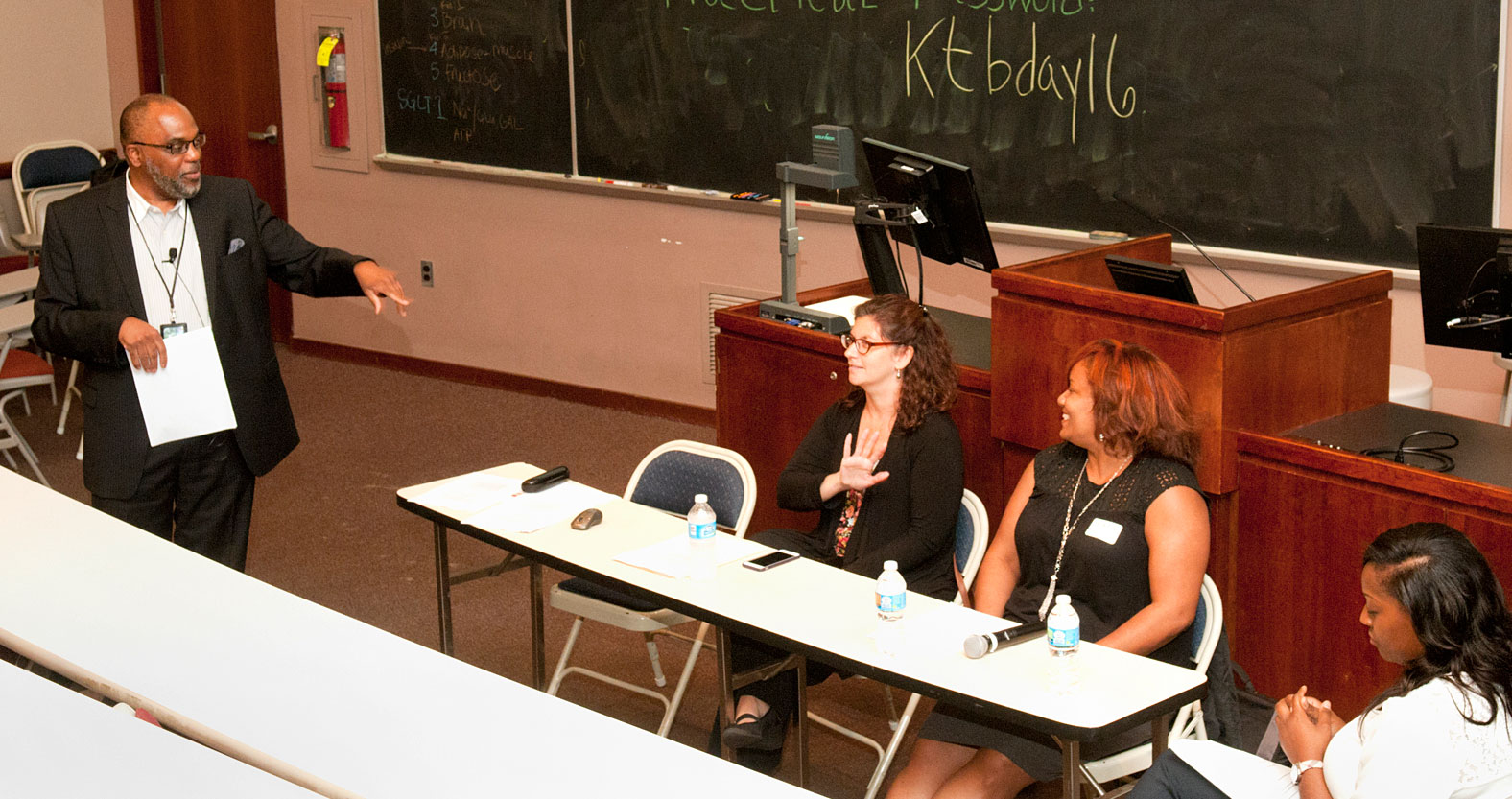IPE Seminar Series Launches
October 18, 2016 DO, psychology, PA studies and ODL students will learn alongside each other, to better
prepare them for the shift toward a team-based approach to patient care.
DO, psychology, PA studies and ODL students will learn alongside each other, to better
prepare them for the shift toward a team-based approach to patient care.
The concept of a team-based approach to health care continues to gain traction among
practitioners, and many studies have suggested it can be incredibly helpful to the
patient; rather than have different aspects of their healthcare handled by a number
of health professionals in different places, a team-based approach puts the patient
at the center, with each member of the healthcare team working together to ensure
none of the patient’s needs falls through the cracks.
Those who will one day practice in this changing healthcare environment will need
to be readily prepared to work in a team-based setting. To that end, PCOM’s Philadelphia
campus has launched a series of seminars focused on interprofessional education (IPE),
which allows students from across disciplines to learn from each other by working
side-by-side. (GA-PCOM currently runs an IPE program of its own.)
In required monthly, three-hour sessions, students in the Osteopathic Medicine, Psychology, Physician Assistant Studies and Organizational Development and Leadership (ODL) programs meet as a large group
to discuss a specific patient issue or case. Then, the students break into smaller
groups and work together to develop a solution. Finally, the groups come back together
and present their suggestions to the facilitating faculty members.
 Jeff Branch (left), EdD, program director, organizational development and leadership,
is one of the faculty members leading the seminar series.
Jeff Branch (left), EdD, program director, organizational development and leadership,
is one of the faculty members leading the seminar series.
“We not only want to enhance the critical thinking of our students, but we want to
show them the benefit of working alongside others, respecting and considering their
viewpoints, in order to service the patient effectively,” said Jeff Branch, EdD, program
director, organizational development and leadership.
In the series’ first seminar in September, students considered the unique challenges
that can occur when people from different cultures interact with one another. Stephanie Felgoise, PhD, vice-chair, clinical PsyD, told the students that this could be true of working
with a patient who was of a different cultural background, or even when working with
practitioners in other fields.
“Everything can be thought of as a culture,” she said. “Anytime a patient crosses
into a healthcare threshold, they are coming into a medical culture. And you all are
a part of that culture, bringing with you experiences from your own cultures.”
Christine Mount, MS, PA-C, director of didactic studies, physician assistant studies,
says that adding the ODL component to the seminars offers students yet another viewpoint.
“It helps broaden the mind, and allow students to consider the business side of healthcare
from an earlier point in their training.”
Faculty say that outcomes will be determined by student input and faculty observations,
all of which will go toward modifying the program for the 2017-2018 academic year
if need be.
“Healthcare is a team sport,” said Michael Becker, DO ’87, MS, vice-chair, family medicine. “The best thing for our patients is for all of us to
combine our expertise and work together, rather than working in silos.”
You May Also Like:
About Philadelphia College of Osteopathic Medicine
Established in 1899, Philadelphia College of Osteopathic Medicine (PCOM) has trained
thousands of highly competent, caring physicians, health practitioners and behavioral
scientists who practice a “whole person” approach to care—treating people, not just
symptoms. PCOM, a private, not-for-profit accredited institution of higher education,
operates three campuses (PCOM, PCOM Georgia and PCOM South Georgia) and offers doctoral degrees in clinical psychology, educational psychology, osteopathic
medicine, pharmacy, physical therapy, and school psychology. The college also offers
graduate degrees in applied behavior analysis, applied positive psychology, biomedical
sciences, forensic medicine, medical laboratory science, mental health counseling,
physician assistant studies, and school psychology. PCOM students learn the importance
of health promotion, research, education and service to the community. Through its
community-based Healthcare Centers, PCOM provides care to medically underserved populations.
For more information, visit pcom.edu or call 215-871-6100.
Contact Us
For general media inquiries, please contact the Office of Marketing and Communications
at 215-871-6300 or communications@pcom.edu. Visit our media relations page to view contact information for public relations personnel.
Connect with PCOM

 DO, psychology, PA studies and ODL students will learn alongside each other, to better
prepare them for the shift toward a team-based approach to patient care.
DO, psychology, PA studies and ODL students will learn alongside each other, to better
prepare them for the shift toward a team-based approach to patient care. Jeff Branch (left), EdD, program director, organizational development and leadership,
is one of the faculty members leading the seminar series.
Jeff Branch (left), EdD, program director, organizational development and leadership,
is one of the faculty members leading the seminar series.